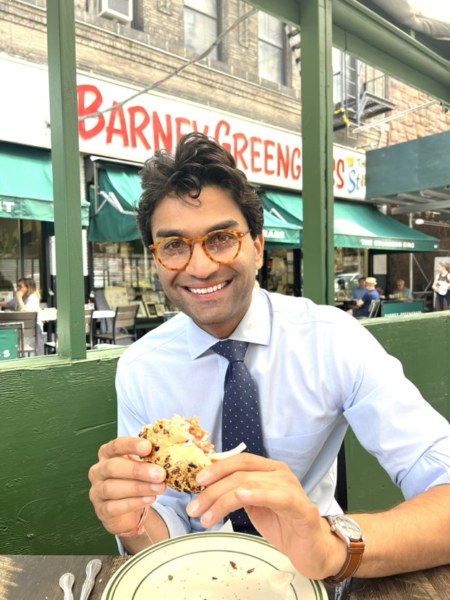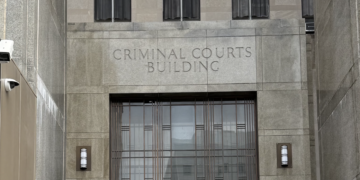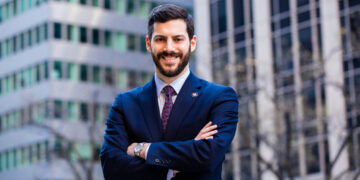
By Allison Moon
Suraj Patel is a Democratic candidate in New York’s Congressional District 12, the seat newly redrawn by a controversial redistricting plan. The plan pits veteran East Side Democrat Carolyn Maloney (who represented the old District 12) against Jerrold Nadler, who has long represented a district that includes the Upper West Side.
Maloney and Nadler are all about experience and longevity (they’ve served a combined 60 years in the House). Patel has never held political office, but at 38 is a young contender who may benefit from vote splitting for the two incumbents.
Patel made headlines on June 28th, when former Democratic presidential candidate Andrew Yang endorsed him, asking crowds, “Do you want someone who’s going to be on the verge of retirement next time Democrats really have a chance to get something done, or do you want someone who will be, at that point, in his early forties, just building seniority and representing this district and community for years and years to come?”
According to his campaign website, Patel is an “attorney, business leader, advocate, and NYU lecturer of business ethics.” He worked on both of President Barack Obama’s presidential campaigns and as an associate on the White House Advance Team. He has run twice against Maloney for her old Congressional District 12 seat, in 2018 and then in 2020, when Patel lost by less than four percentage points. He will go head to head with Nadler and Maloney in the battle for NY-12 in the August 23rd Democratic primary, which the West Side Rag recently took to the streets to survey Upper West Siders about.
Patel spoke with the Rag late last week about his lack of experience, his thoughts on the redistricting plan, and how his 2020 defeat by Maloney turned out to have a surprise silver lining.
The interview has been edited for length and clarity.
WSR: What would you say to a potential voter who’s still concerned about your lack of political experience compared to other candidates?
SP: I have experience that’s very distinct from my two opponents. I’m the only one in this race who’s signed both sides of the paycheck and who has employed, created jobs, and saved jobs. And at the same time, I teach at a business school and I’ve worked for President Obama firsthand, out of a suitcase for two years of my life. I’ve been a lifelong Democrat. So I have experience in both the public and private sectors. And I think coming out of COVID, with a 7.5% unemployment rate in this city, we’ve got a crisis of livability in New York. Because, for three decades, these kinds of incumbents have just led to a culture of “no.” I don’t think they have the right kind of experience to get the city and the country back on track, and to make a new case for Democratic and New York values.
WSR: Could you talk a little bit more about being a first generation immigrant, and what experiences and perspectives you think that affords you as a candidate, especially in a place like New York, which is so diverse?
SP: My parents moved from India, with literally nothing, to America to look for economic opportunity. My dad became an engineer, that’s why he moved here, and was an engineer for the MTA. When I was five, my first memory was of living above a bodega that we ran. A one-bedroom apartment, 13 of us, my grandmother, my grandfather, my great grandmother, four generations of Patels living in a one-bedroom apartment. We slept on the floor in a line. I actually didn’t sleep in my own bed until I was in ninth grade.
On Sunday mornings we’d stack and arrange newspapers that came in separate sections, so that when we did the arranging ourselves, we could make an extra dime selling them. We built the family business and lived the American dream, one dime at a time. And I really fundamentally believe in it. I think we as Democrats have to get back to leading with our values and talking about education, opportunity, and upward mobility, and being inclusive and bringing people in. This colors my entire view of politics. That America can work and it can work better when we afford more people opportunity.
I think my story really, really resonates with West Siders. I feel like a lot of West Siders that I’ve talked to in the last four or five weeks, at farmer’s markets and things like that, have a similar, maybe one or two generation backstory of leaving, or their grandparents leaving, or their parents leaving Hungary or Poland or occupied Eastern Europe. And it seems like there’s just much more closeness to that sort of experience than I’ve seen on the East Side. It gives me a feeling that the West Side has sort of a social justice, liberal core DNA to it. You hear people talking about, you know, joining the marches in Selma, or the civil rights leadership projects and law projects, things like that. So I really feel like I have a political home on the Upper West Side.
WSR: Yeah, I was doing a piece about redistricting. And I was talking to people on the street. And a lot of people on the West Side, even older people, were frustrated about being grouped in with the Upper East because they were like “the West Side is so much more progressive, and we actually care about social justice!”
SP: And so I’m pretty thrilled about it.
WSR: You mentioned in your campaign video that you thought that career politicians were trying to cut you out of the district, which only ended up helping Republicans. Can you talk more about the politics of the redistricting process, as you see it, and what the motivating interests were really for that, corrupt or not, in your eyes?
SP: I went to NYU Law School and Professor Sam Issacharoff was a famous gerrymandering expert, and I took all his law and democracy classes. And I’ve actually taught gerrymandering and voter suppression to lawyers, and so one thing I would say is, call me old fashioned, but I think voters should choose their politicians and not the other way around. And we recently have heard a lot about partisan gerrymandering.
But for centuries, the much more invidious gerrymandering is incumbency protection: Republicans and Democrats get together in a smoke-filled room and say, “alright, here’s my six guys, here’s your seven guys, and let’s just protect them all because this is what we want.” And they draw lines to protect themselves. And you reach the point where incumbency was almost guaranteed. And what we saw in the New York race here on redistricting was both a partisan gerrymander upstate and throughout, but also a massive incumbency protection gerrymander downstate in Manhattan. [Nicholas] Fandos reported this in the New York Times last year, I think in November, that Maloney was angling to shed thousands of Latino and young voters from her district. And if you look at a map of the gerrymander that came down, it almost surgically excised every single area that I beat Maloney in two years ago.
WSR: What major themes have you seen emerging in terms of what voters want to see in their next congressperson? And how has that informed your policy priorities? Are they adapting over time as you have these conversations?
SP: We’ve been fortunate to be consistent on a message that seems to be a message whose time has arrived, which is the fundamental question of protecting our democracy. From old threats, like gerrymandering, voter suppression, and now an insurrection, and new threats like misinformation, cyberattacks, echo chambers. I think people are fundamentally terrified of the ethics and money in politics and the structure of our democracy, whether it gets rescued, whether Trump comes back. While we may have defeated Trump for now, Trumpism is clearly reviving across the country, in much more difficult and scary ways like homophobia, anti-semitism, Asian-American attacks. There’s a lot of stuff happening that terrifies our electorate.
It feels like there’s a regression – that like the 1973, 1980s generations will have been a high point in rights: on reproductive rights, on gun control, on union rights. And then we’ve only slid backwards and I think one thing people recognize is that it took a generation of people to really organize and fight for those rights, and it’s going to take another generation to grow them back. And that’s a 10-20 year project, it’s not a two-year, three, four-year thing. I think people are just hungry for generational change specifically aimed at saving our democracy and saving liberal democracy across the world.
WSR: This is a bit of an Upper West Side free for all. Do you have a favorite establishment on the Upper West Side? Anything you find particularly notable about the Upper West Side? Anything you’ve noticed in conversations with Upper West Siders?
SP: I’ve got two dogs. I feel like the Upper West Side has been significantly more dog-friendly than the Upper East Side. I’ve gone to Boat Basin with my pups. It sounds crazy, but I actually am gonna say Zabar’s is a favorite. And it’s not just because it’s obviously known – I know Eli Zabar’s son, who went to med school with my older brother. And the two of us went out on the Hudson sailing and stuff with him like a decade ago. So I was forced at an early part of my New York time to own up to the idea that Zabar’s is definitely the best bagel in New York. I’m a true Zabar’s fan, in a personal way.
WSR: Anything you want readers of the West Side Rag to know, perhaps not just political things, your hobbies, your values?
SP: I have a massive Indian family. I live with my brother and one-year-old nephew, sister-in-law, younger brother, all in the same building. I just got engaged three weeks ago! That’s a scoop, I don’t think I’ve told anyone that. You’ll be breaking news here. [Laughs]. So we actually met after my first race, and I lost that race. And the silver lining here was that my now fiancée– at that point, she was a stranger — came up to me and was like, “Hey, I just want to let you know, I voted for you. And I live on your block and like your politics.” And I was like, okay, well, that’s convenient! Now here we are three-and-a-half years later.









I looked at Patel’s website. His platform is nothing more than a hodgepodge of tired progressive bromides.
Nadler is atrocious but Patel is running to his left.
Patel’s platform might go over well with wealthy liberals on the UWS but they will alienate everyone else. Unfortunately, because of progressive candidates like Patel the Dems will get crushed nationwide in November.
Otis is 100% correct. I would rather have somebody who is 100 years old but cares about the community. Patel is part of the DSA Defund the police crowd. I agree with Otis these people may win in our district but they are going to help us get crushed nationwide. Democrats cannot be seen as the party that is pro crime anti-victim! Maloney’s office will call you back even if you’re not in the district, Nadler is MIA
Where do you see that he’s for defunding the police?
Thanks for running this, but I wish the WSR had asked for some specific policy differences between him and the other candidates. I don’t come away from this knowing what sets him apart from Maloney and Nadler other than his biography.
So let’s trash experience and know-how and instead pick up on pure green ambition. Maybe this guy should try (gasp!) actually working for — or even (double gasp!!) volunteering for — a law-maker so he could *learn* how to do the job, rather than simply trashing experience because of, well, experience. (Oops, “age”).
And congratulations on your engagement! But will you divorce your spouse after a couple of decades in favor of a younger one — or is that not “generational change”, too?
I’m in my 70s and while I know and like Jerry Nadler, I agree that it is time for new blood representing the Upper West Side. (Someone with Fire in the Belly.). It’s their world now.
Jerry could retire and use his knowledge of government and politics to mentor and encourage the next generation of young people in our district. The times they are a change.
Sorry Peggy but this is NOT a time for new and inexperienced blood. If you watched the Trump hearings that are going on now, you can begin to see the power of being a Committee Chair in the House (as Nadler is). Whether the Democrats win or lose the House in November, we need a powerful figure like Nadler to be either Chair or ranking minority leader of his committee.
Why not ask him about some of his grotesque campaigning tactics he’s used in the past like setting up fake tinder profiles to get female voters? Sorry, Nadler’s getting my vote
Suraj Patel seems like a nice person, without any meaningful experience for these times. Mazal tov to Suraj on his engagement, wishing him and his fiancee many happy years. Carolyn Maloney is a truly fine member of congress. I am a long-time UWSider and I value highly Jerry Nadler’s experience and expertise, and he has earned my vote, again. It’s a mess that these two members of congress are running for the same seat.
Let us be clear: Doing White House advance does not prepare you for government. Or advocacy. Or listening to varying views, having a long game, creating lasting collaborations, or crafting policy.
Sorry, this interview looks like fodder for a dating profile and not a political candidate.